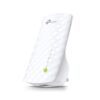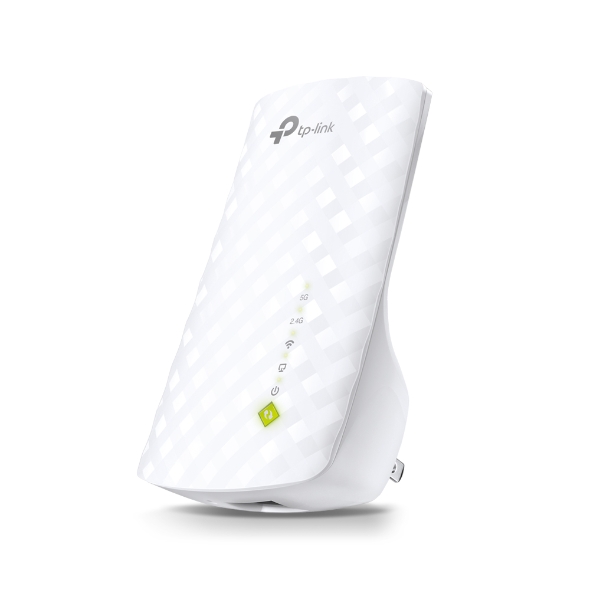

Call for Price
TP-Link RE200 AC750 WiFi range extender flawlessly boosts wireless signal to previously unreachable or hard-to-wire areas.
| Standards and Protocols | IEEE802.11ac,IEEE 802.11n, IEEE 802.11g, IEEE 802.11b |
|---|---|
| Plug Type | EU, UK, US, AU |
| Interface | 1 x 10/100M Ethernet Port (RJ45) |
| Ports | 1× 10/100Mbps Ethernet Port (RJ45) |
| Button | RE (Range Extender) Button, Reset Button |
| Input Power | 100-240V~50/60Hz |
| Power Consumption | About 6.5W |
| Dimensions ( W x D x H ) | 4.3x 2.6 x 3.0in. (110.0 x 65.8 x 75.2mm) |
| Antenna | 3 x internal |
| Wireless Standards | • IEEE 802.11a/n/ac 5GHz • IEEE 802.11b/g/n 2.4GHz |
|---|---|
| Frequency | 2.4GHz & 5GHz |
| Signal Rate | 5GHz:Up to 433Mbps 2.4GHz:Up to 300Mpbs |
| Working Modes | Range Extender/Access Point |
| Reception Sensitivity | 2.4G: 270M: -70dBm@10% PER 130M: -70dBm@10% PER 108M: -73dBm@10% PER 54M: -75dBm@10% PER 11M: -86dBm@8% PER 6M: -92dBm@10% PER 1M: -94dBm@8% PER 5G: 390M: -60dBm@10% PER 29.3M: -83dBm@10% PER 180M: -64dBm@10% PER 13.5M: -87dBm@10% PER 78M: -68dBm@10% PER 6.5M: -90dBm@10% PER 54M: -75dBm@10% PER 6M:-90dBm@10% PER |
| Transmit Power | < 20 dBm (EIRP) |
| Wireless Modes | Range Extender/Access Point |
| Wireless Functions | WMM (Wi-Fi Multimedia) Wireless Statistic Domain Login Function |
| Wireless Security | 64/128/152-bit WEP WPA-PSK / WPA2-PSK |
| Transmission Power | < 20 dBm (EIRP) |
| Mesh Technology | EasyMesh |
| Certification | CE, FCC, RoHS |
|---|---|
| Package Contents | AC750 Wi-Fi Range Extender RE200 Quick Installation Guide |
| System Requirements | Microsoft® Windows® 98SE, NT, 2000, XP, Vista or Windows 7, 8, 10, Mac® OS, NetWare®, UNIX® or Linux. |
| Environment | Operating Temperature: 0°C~40°C (32°F~104°F) Storage Temperature: -40°C~70°C (-40°F~158°F) Operating Humidity: 10%~90% non-condensing Storage Humidity: 5%~90% non-condensing |
Maximum wireless signal rates are the physical rates derived from IEEE Standard 802.11 specifications. Actual wireless data throughput and wireless coverage are not guaranteed and will vary as a result of 1) environmental factors, including building materials, physical objects, and obstacles, 2) network conditions, including local interference, volume and density of traffic, product location, network complexity, and network overhead, and 3) client limitations, including rated performance, location, connection quality, and client condition.
The product may not be compatible with routers or gateways with firmware that has been altered, is based on open source programs, or is non-standard or outdated.
Actual network speed may be limited by the rate of the product’s Ethernet WAN or LAN port, the rate supported by the network cable, Internet service provider factors and other environmental conditions.

Enter your details below to save your shopping cart for later. And, who knows, maybe we will even send you a sweet discount code :)